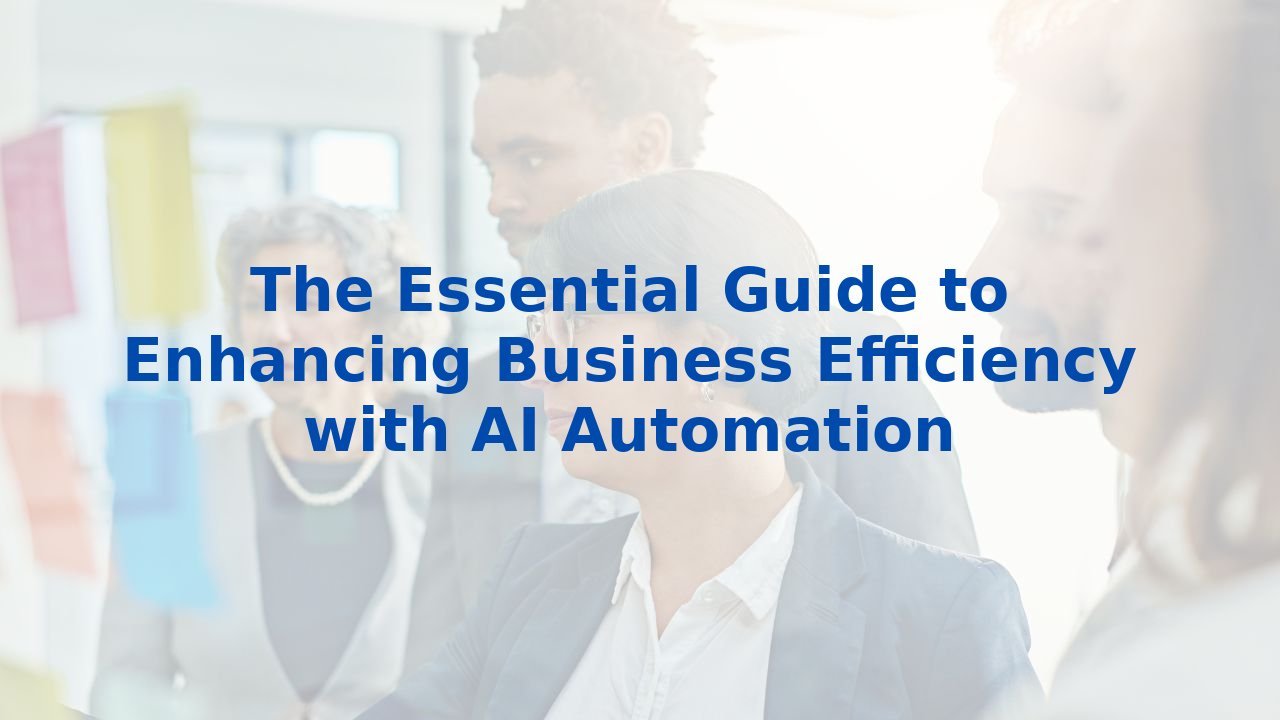The Essential Guide to Enhancing Business Efficiency with AI Automation
The Essential Guide to Enhancing Business Efficiency with AI Automation
In an age where speed and efficiency dictate success, the emergence of Artificial Intelligence (AI) automation is revolutionizing the way organizations conduct their business. Simply put, AI is a potent tool that, when implemented strategically, can significantly enhance operational efficiency and unleash innovation. Let’s dive into how AI can optimize various business processes and the remarkable benefits it holds for enhancing efficiency within an organization.
The Impact of AI on Business Efficiency
AI automation is not merely a trend; it represents a paradigm shift in how businesses operate. Through automation, organizations can refine processes, reducing both time and resources needed to complete essential tasks. It allows companies to streamline operations, from mundane data entry to more intricate decision-making processes, fundamentally altering the workflow landscape.
Process Optimization
One of the foundational advantages of AI lies in its capability for process optimization. Think about the routine, repetitive tasks that plague your team's productivity; tasks like data entry, invoice processing, or managing customer inquiries. By deploying AI, these time-consuming activities can be automated, granting employees the freedom to engage in more strategic initiatives. Imagine a world where your team spends less time on drudgery and more time innovating or developing impactful strategies to elevate the business.
Advanced Data Analytics
In an era defined by data, having the means to analyze it swiftly and accurately stands as a competitive advantage. AI leverages advanced machine learning and natural language processing to derive insights from large data sets, thus enabling organizations to make informed and strategic decisions. This data-driven mindset offers not only clarity but also enhances the precision of forecast outcomes and decision-making processes, effectively transforming raw data into actionable intelligence.
Customer Experience Personalization
Today’s consumers yearn for personalized experiences tailored to their preferences. AI plays a crucial role in achieving this by facilitating intelligent interactions. With AI-driven chatbots, businesses can provide prompt and accurate responses that align with individual customer needs. Furthermore, AI can sift through customer feedback, providing insights into their desires, which leads to improved service strategies and product development. When customers feel valued and understood, their loyalty to a brand significantly increases.
Error Reduction and Precision
Human error is an inevitable aspect of any business operation. Enter AI. The systems employed by AI can process and analyze data swiftly and with impeccable accuracy, thereby minimizing the chances of mistakes. Fields requiring precision, such as financial accounting or data management, can immensely benefit from this accuracy. By swiftly identifying discrepancies or errors, AI not only enhances product quality but reduces the need for rework, thereby saving time and resources.
Cost Savings and Increased Productivity
Efficiency and savings go hand in hand. As organizations integrate AI into their operations, they witness profound cost savings alongside increased productivity. By reallocating resources from routine tasks to more strategic endeavors, companies can mitigate labor costs and efficiently utilize their workforce. Astonishingly, research indicates that AI could enhance employee productivity by up to 40% by 2035, effectively changing the way we perceived workload management.
Innovation and Product Development
AI also serves as a catalyst for innovation, refining the entire development cycle from ideation to production. Its predictive capabilities allow businesses to anticipate market demands accurately. By doing so, firms can remain agile, responding to shifting market landscapes and consumer needs more adeptly than ever before. Predictive models can also optimize inventory management, helping companies avoid stockouts and enhance customer satisfaction.
Training Employees for AI
As we embrace the potential of AI, it is pivotal to acknowledge the human element in this technological transformation. Training employees on effective AI system usage is essential in maximizing the benefits of integration. When your workforce understands how to collaboratively operate with AI tools, they can identify opportunities for enhanced efficiency and develop skills that complement these advanced technologies. Equipping employees with AI knowledge is not just an investment in technology; it's an investment in human capabilities.
Conclusion
Integrating AI into business operations is more than just a modernization trend—it's a crucial strategy that paves the way for efficiency, innovation, and customer satisfaction. By automating mundane tasks, optimizing data utilization, and personalizing consumer interactions, organizations position themselves advantageously in today's competitive landscape. However, to fully harness the potential of AI, a focus on employee training is indispensable. When everyone is equipped to leverage these advancements, your organization moves toward a future defined by intelligence and competitiveness. Embrace the power of AI automation and watch your business transformation unfold.



